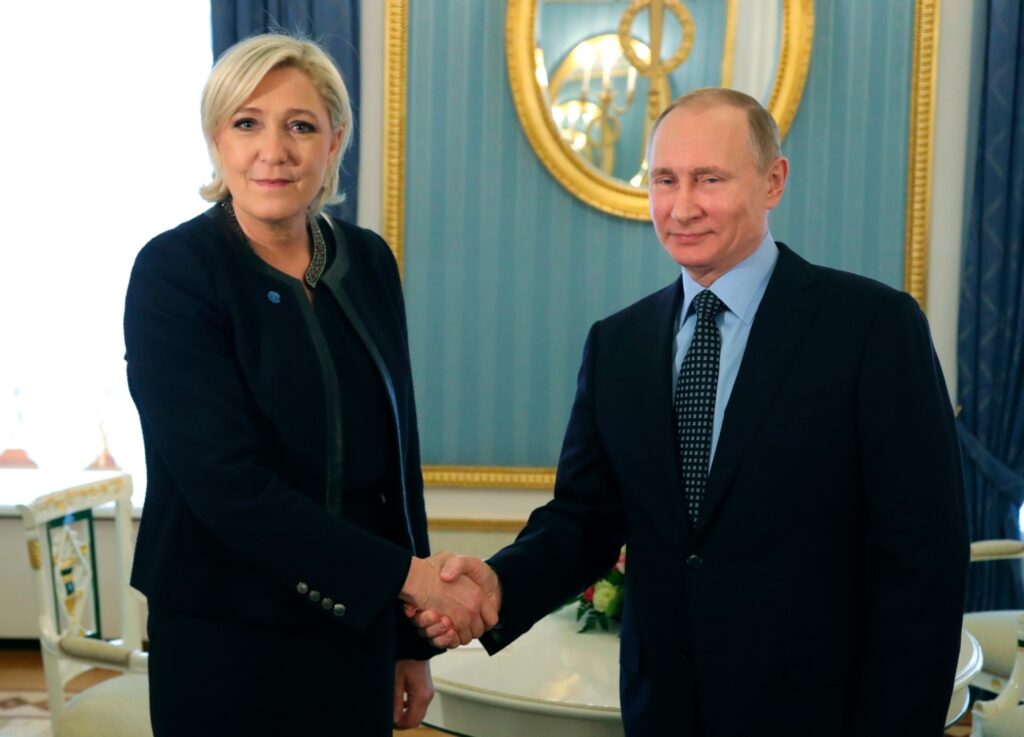
As the Russian invasion of Ukraine continues to shake the foundations of international politics, another momentous event that is unfolding in Europe – France’s presidential election – also portends significant consequences for the future of Europe and the West.
The result of the first round of France’s presidential election – which took place on Sunday, April 10th – was alarmingly close. President Emmanuel Macron received 28% of the vote, while his longtime far-right opponent, Marine Le Pen, won 23%. As the top-two vote-getters, Macron and Le Pen will advance to a run-off election, which is scheduled for April 24th.
Le Pen, who once said that the policies she represents “are the policies that are represented by Mr. Trump [and those] represented by Mr. Putin” is now on the cusp of the French presidency. This is a prospect that should scare anyone – both within France’s borders and far from them – who believes in democratic values and basic freedoms.
Indeed, Le Pen’s far-right positions involve a dangerously nationalist and isolationist foreign policy posture, an openness to embracing autocrats like Vladimir Putin, and a history of anti-Semitic and anti-immigrant rhetoric.
At this crucial time, when democratic values are under siege in Ukraine, autocracy is on the rise globally, and worldwide anti-Semitism is at record levels, Le Pen winning the election would have disastrous and far-reaching consequences.
To be sure, Le Pen’s rise is part of a disturbing trend in Western countries – including the United States – that has been unfolding over the last decade or so, in which nationalist and extremist candidates have become mainstream political leaders.
This is, in many ways, is due to the failures of Western “establishment” leaders, who are increasingly viewed as being out of touch with their constituents, part of the “elite” class, and unable to solve major problems.
Inevitably, when citizens are fearful of the current circumstances and feel abandoned by the establishment, they trend towards fringe candidates like Le Pen and Trump – which is illustrated by the fact that, in the first round of the French elections last week, candidates on the extreme-left and extreme-right won a combined majority (57%) of the vote.
French voters blame Macron for the struggling economy, high prices for fuel and groceries, crime, and immigration. At the same time, Macron’s positive arguments clearly aren’t resonating with voters, and research suggests that some of Macron’s key campaign proposals, notably raising France’s retirement age from 62 years old to 65 are deeply unpopular among younger French voters.
All the while, Le Pen is running a France-First campaign – her campaign slogan is “Give the French back their country” – much like Donald Trump’s successful 2016 campaign.
Le Pen has also moderated her image and worked to be perceived as more mainstream, and less fringe right. In doing so, she is connecting with voters by talking about fixing economy and lowering inflation, as well as controlling the rapidly increasing immigrant population.
The similarities between Le Pen and Trump do not stop at their campaign message. Much like Trump, Le Pen has demonstrated an admiration for Vladimir Putin, and an openness toward embracing autocrats. This was a dangerous posture when Trump was in office, and is even more dangerous now amid Putin’s inhumane and unjust assault on Ukraine.
To be sure, a Le Pen win would be a victory for Putin, and would indicate that Western opposition to the war – which has been surprisingly strong and unified – would be less cohesive and forceful going forward. As a result, Putin may feel emboldened to press on further in Ukraine, and perhaps even set his sights on the Baltic states.
Further, if the Western opposition to Putin begins to weaken, China will feel emboldened to impose its will on Hong Kong and Taiwan and undermine democratic freedoms in both of these sovereign territories
Importantly, a Le Pen victory also poses an existential threat to France’s Jewish community, which is the largest in Europe and 3rd largest in the world.
Anti-Semitism in France is already at crisis levels, and while Le Pen has taken steps to soften her anti-Semitic rhetoric, a Len Pen victory will unleash the same anti-Semitic vitriol that the U.S. experienced under Donald Trump.
A recent American Jewish Committee survey of French Jews noted that more than three-quarters of French Jews (77%) agree that anti-Semitism is a concern in French society. Similarly, 74% of French Jews have been victims of anti-Semitic acts including threats and even physical violence.
Related Articles
Equipment tax is hobbling state’s manufacturers
No, President Biden doesn’t have the authority to cancel student loan debt
Waive the gas tax in this costly crisis
Trying to cancel “Flip or Flop” won’t improve home affordability
Let a thousand Silicon Valleys bloom
France is no stranger to anti-Semitism. In, recent years there have been a number of horrific and deadly attacks on Holocaust survivors, terrorist attacks at a Jewish supermarket, and a shooting at a Jewish day school.
While Le Pen has distanced herself from some of the more antisemitic members of her party, let there be no mistake: her victory would legitimize the anti-Semitism that French Jews recognize as pervasive and dangerous.
To be sure, polls ahead of the runoff vote do show President Macron with a slight lead over Le Pen, and there is hope that center and center-left voters will motivated to turnout in a strong enough numbers to thwart Le Pen.
However, if France – the strongest, and only nuclear-armed state in the E.U. – elects a right-wing nationalist with pro-Putin leanings, one thing is clear: the future of Ukraine, the future of Europe’s largest Jewish community, and the survival of global democracy will all be under threat.
Douglas Schoen is a political consultant.
